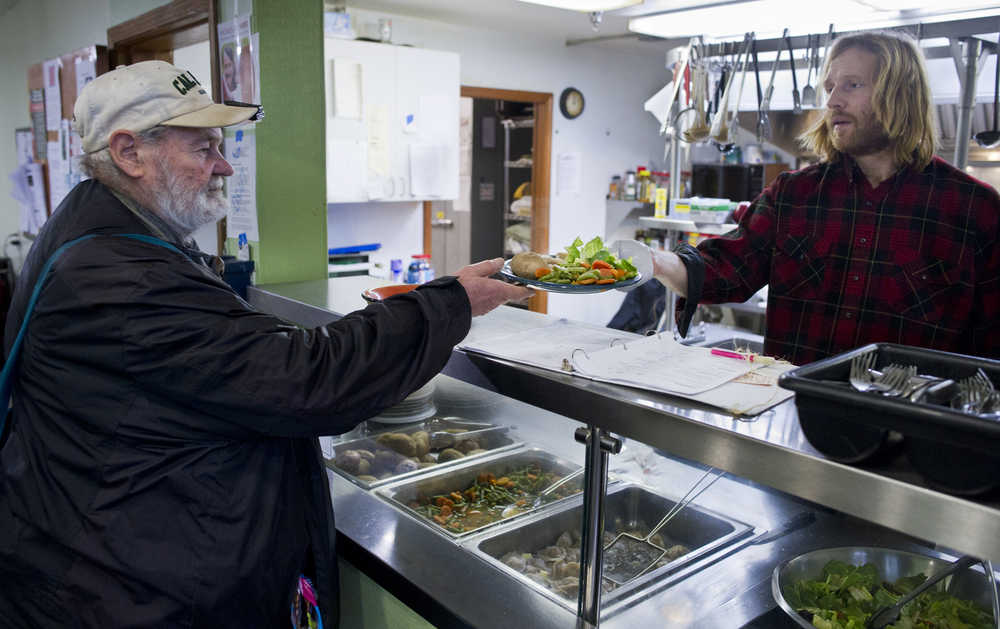There are less than 20 days until Christmas, but there’s a $20,000 fire sprinkler bill on Glory Hole Director Mariya Lovishchuk’s desk, and the first floor of the shelter has a usual crowd of about 20 people waiting for lunch. It doesn’t quite feel like the most wonderful time of the year.
“This is definitely, for us, the hardest, most depressing time,” Lovishchuk said, adding there is no other way to talk about the Glory Hole in December except bluntly.
Lovishchuk said the Glory Hole, an emergency shelter and soup kitchen, is $60,000 in the hole and needs to do something fast before they are forced to dip into reserve funds.
This time of the year is already a difficult one for shelter patrons — people suffer more and have greater needs as it gets colder — and volunteers do what they can to make sure everyone has at least one present so as not to feel disconnected during the holidays. But this looming budget deficit has Lovishchuk wondering what else could go wrong.
Although it isn’t atypical for the shelter to see some sort of deficit as December approaches — Lovishchuk said end-of-the-year donations are highly counted on — this year’s hole was made deeper by pains from last year after a pipe burst and the building experienced extensive flooding.
Insurance didn’t cover it all, but the shelter managed to bounce back, Lovishchuk said. Then there’s the reduction in grant funding for social services statewide that has affected several community charities.
“There’s just so much more dire need all around,” Lovishchuk said.
Although Lovishchuk said this year there hasn’t been an in-house disaster, there was fundraising for Housing First, a project to provide housing for vulnerable, chronically homeless individuals without requiring they quit drinking.
It’s the first project of it’s kind in Juneau and it has required raising several million dollars.
It’s a drain on the community to ask for help with two separate homeless projects, Lovishchuk said, but if the Housing First project isn’t funded now, it might never come to fruition.
“I really think we need to build it now,” Lovishchuk said. “There’s not going to be a chance to build it later with the state budget crisis.”
Lovishchuk said the kind of sacrifices the shelter could make down the road, assuming the deficit isn’t addressed, are staff cuts. But the shelter already “does the maximum with the minimum,” she said.
The only staff position is held by housing specialist Trevor Kellar. His role is vital to the shelter’s mission of not just helping patrons get by day to day, but finding a permanent place in the community. Kellar said in the last year he has found permanent housing for 30 patrons by working with other community organizations.
Lovishchuk said Kellar’s role is grant-funded as of now. Making sure things stay as they are means not having to cut into reserves.
“We have zero wiggle room,” Lovishchuk said. “Right now we do breakfast, lunch and dinner. Are we are going to not do lunch and breakfast? Are we only going to dinner? Right now we’re open 24/7. Are we going to continue to be open 24/7? Those are the kind of decisions that we would have to make if we drain the operating reserve.”
It’s a scary feeling and it’s perennial, wondering if the shelter will have enough to tend to everyone’s needs, Lovishchuk said. To help ease this struggle the board has created a development committee to track funding year-round. The goal is to not wait until the end of the year for a last-minute save that might not come.
“If we don’t (resolve this deficit), we’d have to draw into our rainy day reserve, which I hope we don’t have to because I don’t think this is the rainiest day,” Lovishchuk said. “I think more of a rainy day is coming in the near future. It’s only going to get bleaker.”
To learn more about the Glory Hole Shelter’s needs, visit feedjuneau.org, call 586-4159 or visit 247 S. Franklin St.
• Contact reporter Paula Ann Solis at 523-2272 or at paula.solis@juneauempire.com.

